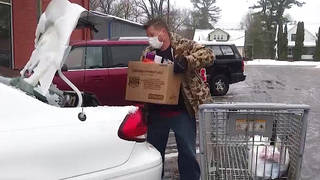
Topics
The World Food Programme, the world’s largest humanitarian organization dealing with hunger and food security, accepted the Nobel Peace Prize today, with its executive director David Beasley warning that the combination of conflict, climate crisis and COVID-19 could push 270 million people to the brink of starvation. In his acceptance speech, Beasley said, “Because of so many wars, climate change, the widespread use of hunger as a political and military weapon, and a global health pandemic that makes all of that exponentially worse, 270 million people are marching toward starvation. Failure to address their needs will cause a hunger pandemic which will dwarf the impact of COVID.”
Transcript
AMY GOODMAN: Just before our live broadcast today, the World Food Programme received the Nobel Peace Prize in an online ceremony, due to COVID-19 restrictions, for what the Nobel Committee described as “its efforts to combat hunger, for its contribution to bettering conditions for peace in conflict-affected areas and for acting as a driving force in efforts to prevent the use of hunger as a weapon of war and conflict,” unquote.
The World Food Programme is the world’s largest humanitarian organization dealing with hunger and food security. It’s now warning the combination of conflict, climate crisis and COVID-19 could push 270 million people to the brink of starvation.
The executive director, the former South Carolina Governor David Beasley, accepted this year’s Nobel Peace Prize award on behalf of the organization from its headquarters in Rome.
DAVID BEASLEY: On behalf of the secretary-general of the United Nations, António Guterres, our board, our sister agencies, our incredible partners and donors, and on behalf of 19,000 peacemakers at the World Food Programme, including those who came before us and especially those who died in the line of duty and their families who carry on, and on behalf of the 100 million people we serve, to the Norwegian Nobel Committee, thank you for this great honor.
Also, thank you for acknowledging our work of using food to combat hunger, to mitigate against destabilization of nations, to prevent mass migration, to end conflict and to create stability and peace. We believe food is the pathway to peace.
I wish today that I could speak of how, working together, we could end hunger for all the 690 million people who go to bed hungry every night, but today we have a crisis at hand. This Nobel Peace Prize is more than a thank you; it is a call to action. Because of so many wars, climate change, the widespread use of hunger as a political and military weapon, and a global health pandemic that makes all of that exponentially worse, 270 million people are marching toward starvation. Failure to address their needs will cause a hunger pandemic which will dwarf the impact of COVID. And if that’s not bad enough, out of that 270 million, 30 million depend on us 100% for their survival. How will humanity respond?
What tears me up inside is this. This coming year, millions and millions and millions of my equals, my neighbors, your neighbors, are marching to the brink of starvation. We stand at what may be the most ironic moment in modern history. On the one hand, after a century of massive strides in eliminating extreme poverty, today those 200 million of our neighbors are on the brink of starvation. That’s more than the entire population of Western Europe. On the other hand, there is $400 trillion of wealth in our world today. Even at the height of the COVID pandemic, in just 90 days, an additional [$2.7] trillion of wealth was created. And we only need $5 billion to save 30 million lives from famine. What am I missing here?
A lot of my friends and leaders around the world have said to me, “You’ve got the greatest job in the world, saving the lives of millions of people.” Well, here’s what I tell them: I don’t go to bed at night thinking about the children we saved; I go to bed weeping over the children we could not save. And when we don’t have enough money nor the access we need, we have to decide which children eat and which children do not eat, which children live, which children die. How would you like that job? Please, don’t ask us to choose who lives and who dies.
In the spirit of Alfred Nobel, as inscribed on this medal, “peace and brotherhood,” let’s feed them all. Food is the pathway to peace.
AMY GOODMAN: “Food is the pathway to peace.” That’s World Food Programme executive director David Beasley accepting this year’s Nobel Peace Prize award on behalf of the organization from its headquarters in Rome, on today, International Human Rights Day.
When we come back, we look at the hunger crisis with Ricardo Salvador of the Union of Concerned Scientists. We’ll also ask him about President-elect Biden’s pick to head the U.S. Department of Agriculture, which could play a key role in feeding millions of Americans facing food insecurity during the pandemic. And then we’ll look at the crisis in Ethiopia. Stay with us.
[break]
AMY GOODMAN: Richard Fariña’s “Birmingham Sunday,” performed by the University of California Riverside Chamber Singers, arranged for chorus by Gene Glickman. Lifelong activist and music professor, Gene passed away last weekend at the age of 86.













Media Options